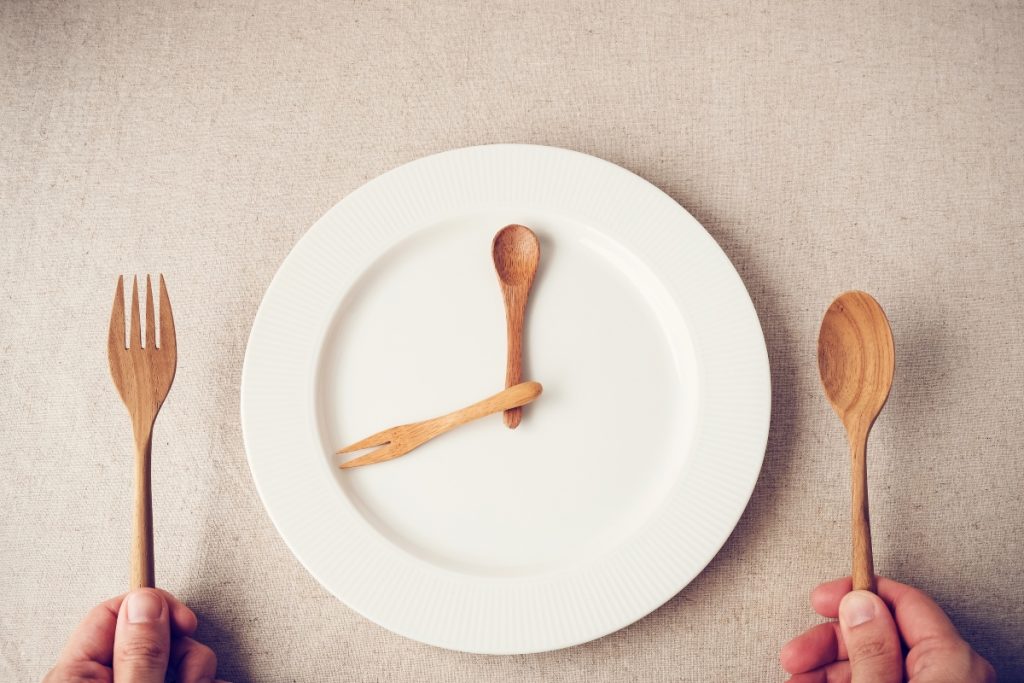Intermittent Fasting

Intermittent Fasting (IF) is a technique where you do not eat anything on a regular and consistent basis. Don’t be horrified by that – it is easier than you think!
The IF pattern we recommend is 16:8, where you fast for 16 hours every day, and eat your daily nutrients in an 8-hour timeframe.
The good thing about this IF pattern is that it’s just 16 hours: 8 hours of that time you are asleep!
Upon waking, rehydrate with a few glasses of water. Then just drink water (optional: add lemon), tea, or coffee for the first 4 hours you are awake. Then you can have the first meal of your day. This meal is packed full of nutrition so it really nourishes your body and keeps you full up until the main meal of the day.
By practising IF, you train yourself to break free from the confines of consumerism and greed. By suppressing your appetite and eating less, you learn that less is more. Often, we think we have to eat and consume more in order to be happy, but this is false. It’s actually the opposite: the less we feel we need, the less we desire, the less consumerism there is in the world, and the happier we will become.
It is easy to become engulfed in consumerism, bad habits, and negativity. That’s because resources are being depleted, and not shared equally in society and across the globe. One way we can make ourselves a bit more bulletproof in this respect is to learn to eat less and consume less. To be content with less.
Fasting is observed in many cultures and religions. In Christianity, Islam, Judaism, and Hinduism, fasting is observed in some way or another.
In Yoga, the second branch is called Niyama. Niyama is to do with self discipline and spiritual observances. When you practice intermittent fasting, you are building your self discipline.
Health Benefits of Intermittent Fasting
Intermittent fasting gives you more energy, allows your digestive system to rest, and helps you cleanse your body of toxins naturally.

When you fast on a brief and consistent basis (e.g. the same day(s), for the same length of time, every week, no exceptions), the body has shown to become stronger in resisting infection, improve hormonal function, and start to heal and rebuild itself. This can also be incredibly beneficial to anyone who lives with a chronic or autoimmune condition.
Leaky Gut
Fasting has been shown to reduce gut permeability (aka Leaky Gut). When you fast once a week, you essentially seal the holes in the lining of your gut by restoring the lining of mucus. This reduces the symptoms of autoimmune conditions that are triggered by factors such as small particles of food or toxins.
Inflammation
Inflammation is at the core of most chronic and autoimmune illnesses. Fasting lowers levels of systemic inflammation and pro-inflammatory cytokines like leptin, which are associated with lupus, multiple sclerosis, ulcerative colitis, type 1 diabetes, and more.
Autophagy
Fasting triggers autophagy, in which your body clears away dead and damaged cells, any debris, and amyloid beta plaques (which are linked to Alzheimer’s and MS). Autophagy stimulates new, healthy cells to grow and increases your body’s ability to resist infection, which may make autoimmune conditions worse.
Glucocorticoids
When you do a 24 hour fast on a consistent basis (ie the same day, every week, no exceptions), the body’s daily secretion of glucocorticoids is doubled. It’s like a weekly “pulse” of extra glucocorticoids.
Glucocorticoids are hormones that affect the metabolism of fat and protein, and also reduce inflammation. They can be prescribed as a medicine, but your body actually produces these itself.
Glucocorticoids stop your body from releasing as many inflammatory chemicals and changing the way white blood cells function.
Intermittent Fasting Guidelines
Below is a simple guide for following IF within the framework of the Purification Ritual. The rules are very simple: every day, do not eat for 16 hours a day. The 8-hour timeframe for eating is 11am to 7pm.
- Drink 3-4 glasses of water upon waking at 7am.
- Do not eat until 11am or after. You may drink water (optional: infuse with fruits), tea, or black coffee in that time.
- Drink a probiotic drink at 9am.
- Do your movement, breathwork, and sauna routine.
- Between 11am and 12pm, drink a highly nutritious Renegade Smoothie.
- Do not eat until your main meal of the day at around 6pm. You may drink water (infused with fruits), tea, and black coffee in the day. Reduce day-time caffeine consumption.
- Eat your main meal and make sure it is healthy and plant-based as often as possible.
- Do not eat anything in the 4 hours before you go to sleep. Avoid caffeinated drinks in the evening.
Many of the details in this ritual will mean nothing to you at the moment, but everything will be explained to you throughout the Phase 1 module.
Tailor Your Intermittent Fasting Pattern
We suggest a 16:8 pattern of fasting because it is the most well-known and widely advocated method. But, you may want to choose a different pattern according to your preferences. If, for example you already fast 16:8, you might want to change your fasting pattern for a period of time and see if you notice any additional benefits. Here are some other intermittent fasting patterns that may appeal to you:
The 5:2 Diet
Fasting for 2 days per week. With the 5:2 diet, you choose 2 days per week where you do not eat anything for 20-24 hours. Do not pick two days together, like Monday and Tuesday, but separate them with a day or two of regular eating. Maybe you’d choose Wednesday and Saturday, for example.
Fasting for 2 days per week is observed in Hinduism, typically on Mondays and Saturdays, where they fast until the evening hours and then eat a modest meal.
Eat-Stop-Eat
Choose one day a week where you observe a 24-36 hour fast, every week. For example, you finish your meal on a Wednesday evening at 6.30pm. By 6.30pm on Thursday, you will have fasted for 24 hours. At this time you can break your fast. Or, you can wait until 6.30am on Friday morning to make a 36-hour fast.
Alternate Day Fasting
This is an advanced fasting technique that will only be sustainable on a short term basis, and will only be suitable when you are used to fasting for periods of 24 hours or more.
Alternate-day fasting means fasting every other day, either by not eating anything or only eating a few hundred calories from light, fresh food.
Intermittent Fasting And The Biological Clock
The hypothalamus is the part of the brain that registers your biological clock and calendar. For example, it receives information from the eyes by registering the light-dark cycles of a day, thus setting the circadian rhythm.
Any activity related to the body, when performed in a regular rhythm, helps to set the biological clock. For example, waking and sleeping, eating meals, etc.
The same can be said for fasting. If you choose to observe a regular fast, it is highly beneficial to align your biological clock with your fasting routine.
If you maintain a regular time for sleeping and waking, your biological clock will put you to sleep automatically at the same time each night and wake you up at the right time each morning without an alarm clock. So, choose one pattern within a week to fast, and observe it consistently, otherwise you will disturb the rhythm of your biological clock and fasting will not be as smooth. It even becomes socially acceptable when others realise that you believe firmly and dedicate yourself fully to a weekly fast on a consistent day!
Drinking air makes fasting easier. This is also known as Kaki Mudra in Pranayama. If you wake up feeling very hungry, drinking air makes you feel full, reducing feelings of hunger for several hours. The air can be encouraged into the intestines with a series of movements. The air will then pass out of the body, totally odourless.

